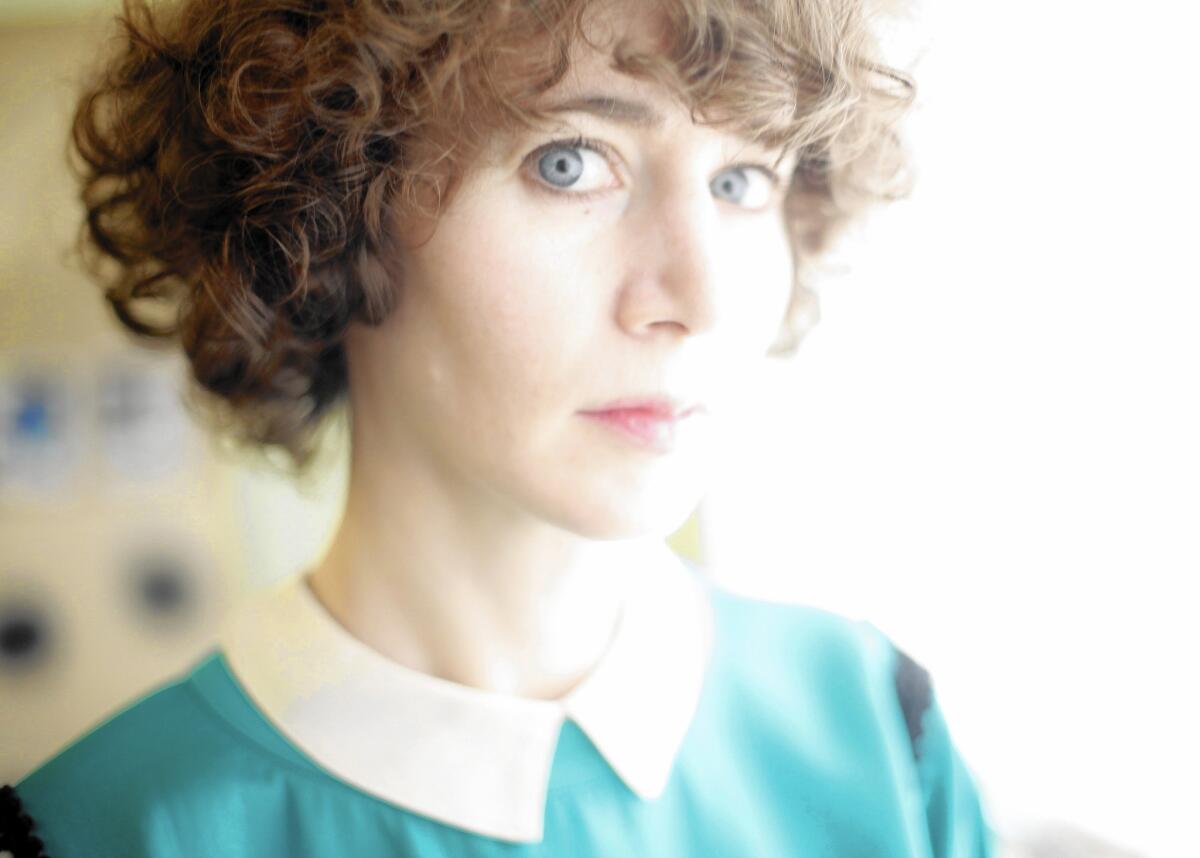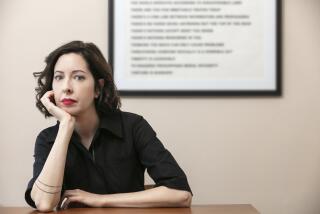Miranda July sheds her pixie image with novel ‘The First Bad Man’

- Share via
Miranda July — filmmaker, performance artist and now novelist — is ready to leave the old Miranda July behind. You know the one: The curly haired gamin, her impossibly blue eyes swirling with ideas. The irrepressible creative blowing cinematic kisses to the world.
Of course, this public image, born around the release of her 2005 Sundance hit, “Me and You and Everyone We Know,” and solidified by her celebrated 2007 short-story collection, “No One Belongs Here More Than You,” catalyzed skeptics as well as fans. While some romanticized her ability to slip among mediums, seemingly unfettered by marketplace demands (she recently released Somebody, an app designed to foster spontaneous social interaction), others found July insufferably twee or just plain confusing.
Her debut novel, “The First Bad Man” (Scribner: 288 pp., $25), is about to complicate the picture. Striking and sexually bold, it reveals a side that is darker and that, truth be told, has lurked in her work all along.
July, who grew up in Berkeley, first established herself in the mid-’90s art scene in Portland, Ore. Now 40, she’d be happy to leave the cutesy, indie sweetheart veneer behind. But no matter what she tells the press, “it still comes across that I’m just, like, the sweetest person, the most wide-eyed,” says July sitting up straight in a chair in her austere studio in Silver Lake, the neighborhood she’s lived in for 10 years. “I don’t think that’s a total misreading, but it’s just funny how it’s stuck.”
People close to her see right through it. “One of my oldest friends once complained, ‘You’re not even that nice,’” July says with a laugh.
Debut novel
Written over three or so years, “The First Bad Man” embraces the strange and taboo: psychosomatic throat problems, weird affairs that cross age boundaries, violent but transcendental interactions between women and the graphic sexual fantasies of a frumpy control freak in her early 40s.
The book’s loose plot is anchored by Cheryl, the aforementioned control freak, a single lady working at a women’s self-defense nonprofit. Her carefully regimented world is upended when Clee, her boss’ 21-year-old daughter, moves in with her. They launch an affair that veers between mother-daughter and aggressor-victim. Even the artiest show on HBO would shy away from this shape-shifting liaison, which explores sexuality without relying on the traditionally erotic. (For instance, Clee, a busty blond, has her hotness factor considerably diminished by an odorous fungal infection on her feet.)
Though “The First Bad Man” actively challenges a reader’s comfort zone, July creates a female neurotic archetype that’s familiar and fresh at once, in some ways a relative of the bumbling, awkward character she plays in her polarizing 2011 movie, “The Future.” Every characteristic that women often criticize in themselves — too much apologizing, always wanting to help, being a doormat — is heightened to the edge of absurdity.
Sheila Heti, a Canadian novelist who became fast friends with July after interviewing her a few years ago, said she was startled by a late draft of “The First Bad Man.” “There’s nothing about the book that you’ve seen before, nothing cliché about it,” Heti says from Toronto. “You feel like you’re the only one reading it, for some reason; it creates this intimacy with the reader.”
Written in the first person, “The First Bad Man” achieves this kind of intimacy by sharing so many of Cheryl’s most private sensations during her passionate brawls with Clee: “When we started up again my skin was tender, bruises were already forming and every muscle was shaking... At the end she quickly squeezed my hand twice: good game. I swished through meetings with a secret, raw, achy feeling that made me lighthearted and hilarious.”
Fusing lust and violence with a maternal bond, July set out to stretch the accepted view of female sexuality. She’s intrigued by “a woman writing about sex in a way that’s maybe not even sexy as much as kind of groundbreaking. Like it gives some more territory for everyone,” July says, citing books such as “Lightning Rods” by Helen DeWitt as inspiration. “It’s pretty calcified territory. There’s definitely room to write about sex, relationships and taboos in new ways.”
The experiences of July’s own life also seem to have indirectly filtered into “The First Bad Man.” Not quite hiding a shy smile, July remembers the passion of crushes she had on grown-ups as a kid as well as her short-lived stint as a sex worker in Portland. At one point, she put an ad in the paper coyly offering sex for money. She had one client, an architect, for a few months. “I hated him. We didn’t keep in touch,” she said wryly.
Babies are another factor in “The First Bad Man,” an unexpectedly tender vein. Cheryl is always searching for Kubelko Bondy, a baby she met when she was 6, by speaking in her mind to other babies and waiting for their reply. On some level, this preoccupation echoes the last few years of July’s life. In 2012, she gave birth to son Hopper with filmmaker-husband Mike Mills. And though she recorded ideas while breast-feeding Hopper, she wasn’t interested in merely transcribing her own experiences into the book.
Instead, she used the newfound emotions of parenthood to connect with the reader. Motherhood, July says, “is the most sort of mainstream thing I’ve ever done, and I enjoy that about it. I have this deep well of new feelings that are very...” she drifts off for a moment with a puzzled expression. “It’s weird, because they’re so universal. Like, I don’t even have to wonder, ‘Do other people feel this?’ Yes, they definitely do. You can go online and find out right now.”
For all its playful subversion, July didn’t write “The First Bad Man” as some sort of stake in the heart of her Portlandia pixie image. That said, the novel should help clarify exactly who July is, her courage, humor and intuition. Instead of backing away from her idiosyncrasies, she embraces them all the more in her fiction.
“To me, the best part of writing is like sleuthing for clues,” July says. “Like, why did I write this? Is this crazy?”
::
Miranda July reading
Where: Skylight Books at Mack Sennett Studios, 1215 Bates Ave., Los Angeles
When: 7:30 p.m. Thursday
Price: $30, includes a copy of the book
Info: skylightbooks.com (323) 660-1175
Wappler is a writer in Los Angeles.
More to Read
Sign up for our Book Club newsletter
Get the latest news, events and more from the Los Angeles Times Book Club, and help us get L.A. reading and talking.
You may occasionally receive promotional content from the Los Angeles Times.










